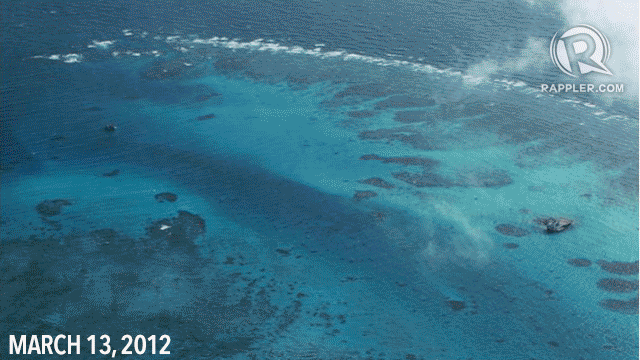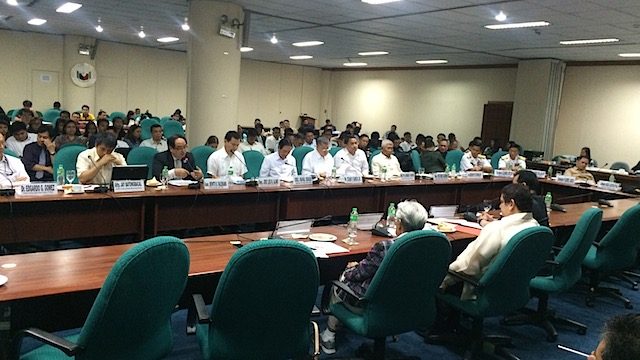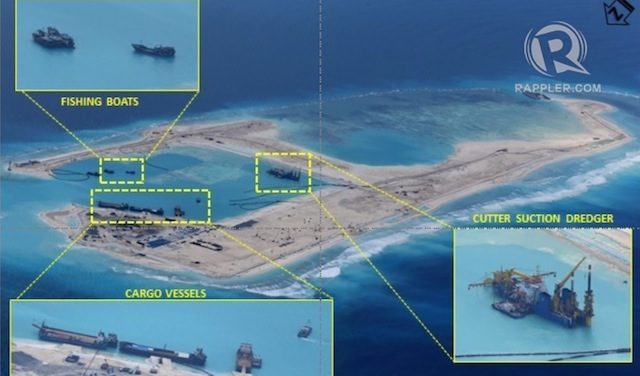SUMMARY
This is AI generated summarization, which may have errors. For context, always refer to the full article.

MANILA, Philippines – China might not have been as aggressive in reclaming reefs in the West Philippine Sea (South China Sea) if the Philippine government did not file the international arbitration case, according to a maritime law expert.
“The reclamation that took place clearly is a response to the arbitration. It’s a geopolitical and military response to the legal track we have taken,” said UP professor Jay Batongbacal, director of the UP Institute of Maritime Affairs and Law of the Sea.
Batongbacal added, “This reclamation, for all practical intents and purposes, will seek to render any legal victory a paper victory.” (READ: Aquino: This battle is not just about China)
It’s a conclusion that National Security Adviser Cesar Garcia dismissed. “That’s speculative. There are arguments for and against that. It could be right or wrong either way.”
“We’re trying to lay the legal basis of our action because we want to make sure that international law is on our side,” Garcia told Rappler.

Batongbacal and Garcia attended the Senate hearing on Thursday, May 7, on China’s activities in the disputed areas. It was a rare venue where the Philippine military, international law experts, and security observers openly discussed China’s activities and scrutinized the government’s strategic response.
Most of the government’s statements on the West Philippine Sea come from the Department of Foreign Affairs following Malacañang’s gag order on the Philippine military. The DFA sent a junior officer to the hearing, disappointing Senator Antonio Trillanes IV who called for the discussion.
Commodore Carlos Agustin of the Institute for Maritime and Ocean Affairs (IMOA) was more critical of the government policy, declaring the decision to file the arbitration case as “erroneous.”
“We all know that the administration has erroneously taken an aggressive stance against China,” said Agustin, former commandant of the Philippine Coast Guard.
He added, “Although correct, the rule of law approach by going to ITLOS (International Tribunal for the Law of the Sea) has antagonized China because it had much earlier pronounced clearly that it was willing to discuss but not multilaterally the SCS issues not to mentional litigation.”
Timeline of China’s reclamation
The timeline supports Batongbacal’s conclusion. While China would have pursued its reclamation activities even if the Philippines did not file a case, he said it would not have been as fast as the current pace of its activities.
Western Command (Westcom) chief Vice Admiral Alexander Lopez said China’s reclamation activities started in mid- 2013, beginning with 4 reefs. But the military only announced China’s activities in May 2014, coinciding with the filing of petitions against the constitutionality of a military-to-military agreement with the US that was signed a month later.
The DFA announced its intent to file an arbitration case against China in January 2014, although the memorial would be filed in March 2014.
The case of the Philippines was provoked by the tense standoff with Beijing in Scarborough (Panatag) Shoal in 2012. The shoal, located off the coast of Zambales, is now practically occupied by the Chinese, depriving local fishermen of their livelihood.
China is currently reclaiming 7 reefs in the Spratlys (Kalayaan Group of Islands). The Philippine military has expressed fear that the reclamation of reefs will result in the militarization of of the disputed areas and possibly cut Philippine access to areas it currently occupies.
Armed Forces chief General Gregorio Catapang Jr raised particular concern over China’s reclamation of Mischief Reef, which is inside the country’s 200-nautical mile exclusive economic zone based on the United Nations Convention on the Law of the Sea (UNCLOS).
Mischief Reef is only 23 nautical miles away from Ayungin Shoal, where the Philippines had grounded a ship to serve as an unconventional navy outpost manned by several Filipino Marines.
The Westcom chief also expressed particular concern over the reclamation in Kagitingan (Fiery Cross) Reef.
Satellite images indicate that China might be constructing its first runway in the South China Sea. This will allow Chinese planes into the disputed area already dominated by Chinese ships. (READ: China to finish construction of airstrip in West PH Sea this year’)

Beyond the arbitration case
Batongbacal said Malacañang should expand its strategy beyond the arbitration case.
“Win or lose, the time horizon involved is within a year at least at this point. Within that year, many things can happen and the biggest challenge to us is the possibility of a major incident which results in injuries or casualties that can escalate into an armed conflict,” he said.
Batongbacal said he is afraid that “there is not enough thought being given to the next step” to have a cohesive strategy especially for the possibility that the dispute could explode into an armed conflict.
He explained: “This demonstrates that the disputes cannot really be addressed in only one particular track or fashion. The criticism from the academe at that time is we may be relying too much on the arbitration and we’re putting all our eggs in one basket. As it turned out, that is not the same basket that China wishes to play with.”
Batongbacal added, “That is why the reclamation probably took place as well as the other activities they’ve entered into such as blockading Philippine vessels, pressuring fishermen away from their fishing grounds and basically harassing other shipping which is not of a commercial nature.”
Garcia gave assurances these are all being studied, stressing that government actions in the West Philippine Sea are “calibrated” and “deliberate.”
“We’re also making sure that we re-orient the armed forces to its external defense role. At the same time, as recommended, we pursue diplomatic track along several initiatives,” Garcia said. – Rappler.com
Add a comment
How does this make you feel?
There are no comments yet. Add your comment to start the conversation.